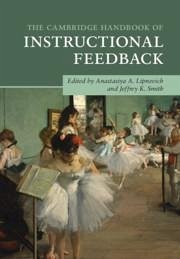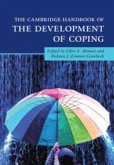The Cambridge Handbook of Instructional Feedback
Herausgeber: Lipnevich, Anastasiya A; Smith, Jeffrey K
The Cambridge Handbook of Instructional Feedback
Herausgeber: Lipnevich, Anastasiya A; Smith, Jeffrey K
- Gebundenes Buch
- Merkliste
- Auf die Merkliste
- Bewerten Bewerten
- Teilen
- Produkt teilen
- Produkterinnerung
- Produkterinnerung
Feedback is essential to learning, and this book summarizes the latest and best research on how instructional feedback impacts achievement.
Andere Kunden interessierten sich auch für
![The Cambridge Handbook of Ethics and Education The Cambridge Handbook of Ethics and Education]() The Cambridge Handbook of Ethics and Education218,99 €
The Cambridge Handbook of Ethics and Education218,99 €![The Cambridge Handbook of Cognition and Education The Cambridge Handbook of Cognition and Education]() The Cambridge Handbook of Cognition and Education227,99 €
The Cambridge Handbook of Cognition and Education227,99 €![The Cambridge Handbook of Democratic Education The Cambridge Handbook of Democratic Education]() The Cambridge Handbook of Democratic Education201,99 €
The Cambridge Handbook of Democratic Education201,99 €![The Cambridge Handbook of the Development of Coping The Cambridge Handbook of the Development of Coping]() The Cambridge Handbook of the Development of Coping151,99 €
The Cambridge Handbook of the Development of Coping151,99 €![Uncertainty x Design Uncertainty x Design]() Ronald A BeghettoUncertainty x Design112,99 €
Ronald A BeghettoUncertainty x Design112,99 €![The Psychology of Conduct The Psychology of Conduct]() Hermann Henry SchroederThe Psychology of Conduct31,99 €
Hermann Henry SchroederThe Psychology of Conduct31,99 €![National Union of Teachers Conference Cambridge Souvenir National Union of Teachers Conference Cambridge Souvenir]() National Union of Teachers Conference Cambridge Souvenir31,99 €
National Union of Teachers Conference Cambridge Souvenir31,99 €-
-
-
Feedback is essential to learning, and this book summarizes the latest and best research on how instructional feedback impacts achievement.
Produktdetails
- Produktdetails
- Verlag: Cambridge University Press
- Seitenzahl: 648
- Erscheinungstermin: 15. November 2018
- Englisch
- Abmessung: 257mm x 188mm x 36mm
- Gewicht: 1315g
- ISBN-13: 9781107179394
- ISBN-10: 1107179394
- Artikelnr.: 52609750
- Herstellerkennzeichnung
- Libri GmbH
- Europaallee 1
- 36244 Bad Hersfeld
- gpsr@libri.de
- Verlag: Cambridge University Press
- Seitenzahl: 648
- Erscheinungstermin: 15. November 2018
- Englisch
- Abmessung: 257mm x 188mm x 36mm
- Gewicht: 1315g
- ISBN-13: 9781107179394
- ISBN-10: 1107179394
- Artikelnr.: 52609750
- Herstellerkennzeichnung
- Libri GmbH
- Europaallee 1
- 36244 Bad Hersfeld
- gpsr@libri.de
Foreword Valerie Shute; Preface Anastasiya A. Lipnevich and Jeffrey K.
Smith; Part I. Theoretical Foundations: Methods and Concepts: 1. Feedback:
at the heart of - but definitely not all of - formative assessment Dylan
Wiliam; 2. Becoming proficient: an alternative perspective on the role of
feedback Gordon Stobart; 3. Summative and formative feedback Susan M.
Brookhart; 4. Toward a taxonomy of written feedback messages Jacqui Murray,
N. Ruth Gasson and Jeffrey K. Smith; 5. Methods in feedback research Gavin
T. L. Brown and Lois R. Harris; Part II. Domain-Specific Feedback: 6.
Assessment feedback in primary schools in Singapore and beyond Kelvin H. K.
Tan and Hwei Ming Wong; 7. Instructional feedback in writing Steve Graham;
8. Instructional feedback in mathematics Marian Small and Amy Lin; 9.
Looking closely at mathematics and science classroom feedback practices:
examining artifacts, students' products and teachers' communications Maria
Araceli Ruiz-Primo and Heidi Kroog; 10. Instructional feedback in music
Kelly A. Parkes; 11. Feedback and noncognitive skills: from working
hypotheses to theory-driven recommendations for practice Dana Murano,
Jonathan E. Martin, Jeremy Burrus and Richard D. Roberts; 12. Feedback in
tertiary education: challenges and opportunities for enhancing current
practices Jacques van der Meer and Phillip Dawson; 13. Instructional
feedback in medical education Joan Sargeant and Christopher Watling; 14.
The 360-degree feedback at workplace: a transformative learning perspective
Vidya S. Athota and Ashish Malik; Part III. Contexts and Sources of
Feedback: 15. Technology-enhanced feedback Cassim Munshi and Christopher C.
Deneen; 16. Feedback and game design Bruce D. Homer, Teresa M. Ober and Jan
L. Plass; 17. Feedback in the context of self-assessment Heidi L. Andrade;
18. Providing formative peer feedback: what do we know? Ernesto Panadero,
Anders Jonsson and Maryam Alqassab; 19. Feedback, correctives, and the use
of pre-assessments Thomas R. Guskey; 20. Teacher expectations and feedback
practices in South African schools Anil Kanjee; 21. Interactive assessment:
cultural perspectives and practices in the nexus of 'heart or mind'
Masahiro Arimoto and Ian Clark; 22. Instructional feedback in animals
Allison B. Kaufman and Michele M. Pagel; Part IV. Student Responses to
Feedback: 23. The emotional dynamics of feedback from the student's point
of view Rick Stiggins; 24. Facilitating students' active engagement with
feedback Anders Jönsson and Ernesto Panadero; 25. Performance feedback and
emotions Thomas Goetz, Anastasiya A. Lipnevich, Maike Krannich and
Katarzyna Gogol; 26. The relationship between creativity and feedback Molly
Holinger and James C. Kaufman; Part V. Concluding Remarks: 27.
Instructional feedback: analysis, synthesis, and extrapolation Jeffrey K.
Smith and Anastasiya A. Lipnevich.
Smith; Part I. Theoretical Foundations: Methods and Concepts: 1. Feedback:
at the heart of - but definitely not all of - formative assessment Dylan
Wiliam; 2. Becoming proficient: an alternative perspective on the role of
feedback Gordon Stobart; 3. Summative and formative feedback Susan M.
Brookhart; 4. Toward a taxonomy of written feedback messages Jacqui Murray,
N. Ruth Gasson and Jeffrey K. Smith; 5. Methods in feedback research Gavin
T. L. Brown and Lois R. Harris; Part II. Domain-Specific Feedback: 6.
Assessment feedback in primary schools in Singapore and beyond Kelvin H. K.
Tan and Hwei Ming Wong; 7. Instructional feedback in writing Steve Graham;
8. Instructional feedback in mathematics Marian Small and Amy Lin; 9.
Looking closely at mathematics and science classroom feedback practices:
examining artifacts, students' products and teachers' communications Maria
Araceli Ruiz-Primo and Heidi Kroog; 10. Instructional feedback in music
Kelly A. Parkes; 11. Feedback and noncognitive skills: from working
hypotheses to theory-driven recommendations for practice Dana Murano,
Jonathan E. Martin, Jeremy Burrus and Richard D. Roberts; 12. Feedback in
tertiary education: challenges and opportunities for enhancing current
practices Jacques van der Meer and Phillip Dawson; 13. Instructional
feedback in medical education Joan Sargeant and Christopher Watling; 14.
The 360-degree feedback at workplace: a transformative learning perspective
Vidya S. Athota and Ashish Malik; Part III. Contexts and Sources of
Feedback: 15. Technology-enhanced feedback Cassim Munshi and Christopher C.
Deneen; 16. Feedback and game design Bruce D. Homer, Teresa M. Ober and Jan
L. Plass; 17. Feedback in the context of self-assessment Heidi L. Andrade;
18. Providing formative peer feedback: what do we know? Ernesto Panadero,
Anders Jonsson and Maryam Alqassab; 19. Feedback, correctives, and the use
of pre-assessments Thomas R. Guskey; 20. Teacher expectations and feedback
practices in South African schools Anil Kanjee; 21. Interactive assessment:
cultural perspectives and practices in the nexus of 'heart or mind'
Masahiro Arimoto and Ian Clark; 22. Instructional feedback in animals
Allison B. Kaufman and Michele M. Pagel; Part IV. Student Responses to
Feedback: 23. The emotional dynamics of feedback from the student's point
of view Rick Stiggins; 24. Facilitating students' active engagement with
feedback Anders Jönsson and Ernesto Panadero; 25. Performance feedback and
emotions Thomas Goetz, Anastasiya A. Lipnevich, Maike Krannich and
Katarzyna Gogol; 26. The relationship between creativity and feedback Molly
Holinger and James C. Kaufman; Part V. Concluding Remarks: 27.
Instructional feedback: analysis, synthesis, and extrapolation Jeffrey K.
Smith and Anastasiya A. Lipnevich.
Foreword Valerie Shute; Preface Anastasiya A. Lipnevich and Jeffrey K.
Smith; Part I. Theoretical Foundations: Methods and Concepts: 1. Feedback:
at the heart of - but definitely not all of - formative assessment Dylan
Wiliam; 2. Becoming proficient: an alternative perspective on the role of
feedback Gordon Stobart; 3. Summative and formative feedback Susan M.
Brookhart; 4. Toward a taxonomy of written feedback messages Jacqui Murray,
N. Ruth Gasson and Jeffrey K. Smith; 5. Methods in feedback research Gavin
T. L. Brown and Lois R. Harris; Part II. Domain-Specific Feedback: 6.
Assessment feedback in primary schools in Singapore and beyond Kelvin H. K.
Tan and Hwei Ming Wong; 7. Instructional feedback in writing Steve Graham;
8. Instructional feedback in mathematics Marian Small and Amy Lin; 9.
Looking closely at mathematics and science classroom feedback practices:
examining artifacts, students' products and teachers' communications Maria
Araceli Ruiz-Primo and Heidi Kroog; 10. Instructional feedback in music
Kelly A. Parkes; 11. Feedback and noncognitive skills: from working
hypotheses to theory-driven recommendations for practice Dana Murano,
Jonathan E. Martin, Jeremy Burrus and Richard D. Roberts; 12. Feedback in
tertiary education: challenges and opportunities for enhancing current
practices Jacques van der Meer and Phillip Dawson; 13. Instructional
feedback in medical education Joan Sargeant and Christopher Watling; 14.
The 360-degree feedback at workplace: a transformative learning perspective
Vidya S. Athota and Ashish Malik; Part III. Contexts and Sources of
Feedback: 15. Technology-enhanced feedback Cassim Munshi and Christopher C.
Deneen; 16. Feedback and game design Bruce D. Homer, Teresa M. Ober and Jan
L. Plass; 17. Feedback in the context of self-assessment Heidi L. Andrade;
18. Providing formative peer feedback: what do we know? Ernesto Panadero,
Anders Jonsson and Maryam Alqassab; 19. Feedback, correctives, and the use
of pre-assessments Thomas R. Guskey; 20. Teacher expectations and feedback
practices in South African schools Anil Kanjee; 21. Interactive assessment:
cultural perspectives and practices in the nexus of 'heart or mind'
Masahiro Arimoto and Ian Clark; 22. Instructional feedback in animals
Allison B. Kaufman and Michele M. Pagel; Part IV. Student Responses to
Feedback: 23. The emotional dynamics of feedback from the student's point
of view Rick Stiggins; 24. Facilitating students' active engagement with
feedback Anders Jönsson and Ernesto Panadero; 25. Performance feedback and
emotions Thomas Goetz, Anastasiya A. Lipnevich, Maike Krannich and
Katarzyna Gogol; 26. The relationship between creativity and feedback Molly
Holinger and James C. Kaufman; Part V. Concluding Remarks: 27.
Instructional feedback: analysis, synthesis, and extrapolation Jeffrey K.
Smith and Anastasiya A. Lipnevich.
Smith; Part I. Theoretical Foundations: Methods and Concepts: 1. Feedback:
at the heart of - but definitely not all of - formative assessment Dylan
Wiliam; 2. Becoming proficient: an alternative perspective on the role of
feedback Gordon Stobart; 3. Summative and formative feedback Susan M.
Brookhart; 4. Toward a taxonomy of written feedback messages Jacqui Murray,
N. Ruth Gasson and Jeffrey K. Smith; 5. Methods in feedback research Gavin
T. L. Brown and Lois R. Harris; Part II. Domain-Specific Feedback: 6.
Assessment feedback in primary schools in Singapore and beyond Kelvin H. K.
Tan and Hwei Ming Wong; 7. Instructional feedback in writing Steve Graham;
8. Instructional feedback in mathematics Marian Small and Amy Lin; 9.
Looking closely at mathematics and science classroom feedback practices:
examining artifacts, students' products and teachers' communications Maria
Araceli Ruiz-Primo and Heidi Kroog; 10. Instructional feedback in music
Kelly A. Parkes; 11. Feedback and noncognitive skills: from working
hypotheses to theory-driven recommendations for practice Dana Murano,
Jonathan E. Martin, Jeremy Burrus and Richard D. Roberts; 12. Feedback in
tertiary education: challenges and opportunities for enhancing current
practices Jacques van der Meer and Phillip Dawson; 13. Instructional
feedback in medical education Joan Sargeant and Christopher Watling; 14.
The 360-degree feedback at workplace: a transformative learning perspective
Vidya S. Athota and Ashish Malik; Part III. Contexts and Sources of
Feedback: 15. Technology-enhanced feedback Cassim Munshi and Christopher C.
Deneen; 16. Feedback and game design Bruce D. Homer, Teresa M. Ober and Jan
L. Plass; 17. Feedback in the context of self-assessment Heidi L. Andrade;
18. Providing formative peer feedback: what do we know? Ernesto Panadero,
Anders Jonsson and Maryam Alqassab; 19. Feedback, correctives, and the use
of pre-assessments Thomas R. Guskey; 20. Teacher expectations and feedback
practices in South African schools Anil Kanjee; 21. Interactive assessment:
cultural perspectives and practices in the nexus of 'heart or mind'
Masahiro Arimoto and Ian Clark; 22. Instructional feedback in animals
Allison B. Kaufman and Michele M. Pagel; Part IV. Student Responses to
Feedback: 23. The emotional dynamics of feedback from the student's point
of view Rick Stiggins; 24. Facilitating students' active engagement with
feedback Anders Jönsson and Ernesto Panadero; 25. Performance feedback and
emotions Thomas Goetz, Anastasiya A. Lipnevich, Maike Krannich and
Katarzyna Gogol; 26. The relationship between creativity and feedback Molly
Holinger and James C. Kaufman; Part V. Concluding Remarks: 27.
Instructional feedback: analysis, synthesis, and extrapolation Jeffrey K.
Smith and Anastasiya A. Lipnevich.








